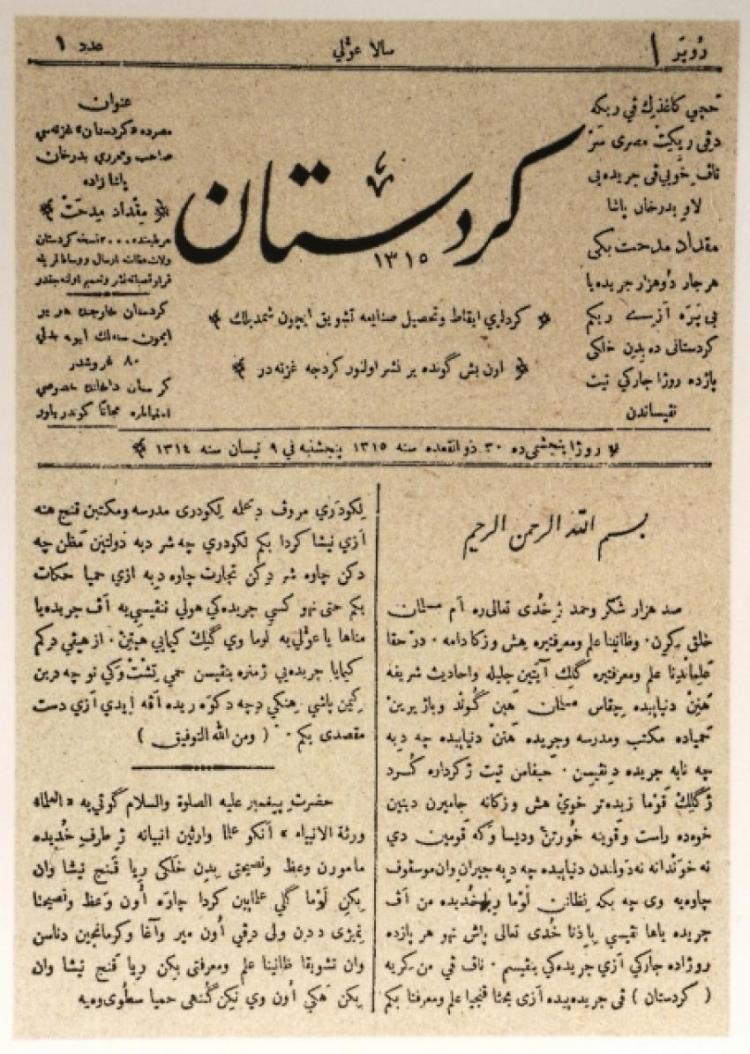Qamishli – North-Press Agency
Zana al-Ali
On Wednesday, Kurdish journalism lit the 122nd candle for the birth of the first Kurdish newspaper. However, it still faces criticism by the Kurdish public regarding the national issue and various other issues related to professionalism and bias in covering Kurdish topics.
On April 22, 1898, the Kurdish Prince Meqdad Medhat Badirkhan established the famous Kurdish-language newspaper “Kurdistan”, which many historians consider to be the first Kurdish newspaper. This date became an important day for Kurdish journalism, which is now celebrated by Kurdish journalists as well as cultural and partisan institutions in Iraq, Syria, Iran, Turkey, and the diaspora.
Alan Beki, a resident of the city of Kobani in northern Syria, said that in recent years, Kurdish journalism has played a positive role in Rojava (northern Syria), and exercised the role of the fourth estate by presenting the suffering of the people to the public opinion and pressuring the Autonomous Administration in an acceptable manner.
But his talk with North-Press was not without criticism of the Kurdish media, as “it is unlike international journalism in terms of professionalism. Despite the huge increase in the number of media in all its forms, it is still weak and unable to make the Kurdish issue into a global one. This is compared to international journalism, which transforms very simple issues into globally fundamental ones.”
Beki stressed that local journalism has not achieved anything for the Kurdish issue at the international level, noting that “had it not been for international journalism covering the ISIS attack on Kobani, the city would not have become the capital of the global resistance, and we saw that Kurdish media could not do anything in Afrin.”
Meanwhile, Avin Muhammad Youssef, co-chair of the Free Media Union, said that Kurdish journalism cannot be compared to its international counterpart for several reasons. The most important of these is that “the Kurds are divided between four countries which are occupying the geography of Kurdistan, and those countries utilize all types of repressive methods to suppress Kurdish identity, especially amongst intellectuals. This is in addition to attempts to exterminate the Kurdish people, so the publication of “Kurdistan” was the first step in the history of Kurdish journalism. It was a good and bold step at the time, but despite the multiplicity of publications and media outlets during the past 122 years, Kurdish journalism has still not risen to the required level due to political disintegration and partisan conflicts which are still present.”
Meqdad Medhat Badirkhan was one of the sons of the Badirkhan family, which ruled the Jazira-Botan region, located in the present-day Şirnex Province in northern Kurdistan (southeastern Turkey).
Due to the family’s persecution by the Ottomans, he was forced to emigrate to the Egyptian capital Cairo, where the cultural movement was active, and from there, he published his newspaper in the Kurdish language written in Arabic script that was approved at the time.
Party-affiliated journalism
During the past century, newspapers were seldom published by independent Kurdish institutions. Rather, the publication of Kurdish newspapers and magazines were accompanied by political movements, especially partisan ones.
Dr. Bakhtiyar Medres Hussein, a resident of the city of Kobani, said that though there has been a large number of Kurdish media outlets, this has played a negative role in regards to the people, as they were unable to make any positive changes on the issue of Kurdish rights.
In the same context, Alan Beki added that most of the media in Rojava entered into partisan conflicts as a result of its loyalty to political parties, noting again that the reason for not marketing the Kurdish issue in the international journalism is that partisan agendas that have become part of these political conflicts.
On the same issue, Avin Muhammad Youssef agreed with Hussein and Beki that Kurdish journalism “could not be a factor of reconciliation among Kurdish conflicting parties, but rather, it fell into the quagmire of partisanship and bias, so that it became a means of spreading hate speech that reflected badly on the Kurdish community and caused its dissolution.”
Good steps
Heybar Othman, a journalist working as a reporter for the American Alhurra TV channel, said that Kurdish journalism has witnessed a remarkable development during the past years due to the margin of freedom that prevailed in the area controlled by the Syrian Democratic Forces (SDF); this was not accessible under the control of the Syrian government.
He added to North Press that many Kurdish journalists have received international awards, and that some Kurdish journalists are working with distinguished Arabic and international channels, which is considered progress in the march of journalism.
Othman pointed out that Kurdish media was able to replace Arabic media in reporting the news through Kurdish channels to a Kurdish audience.
“Yes, Kurdish journalism managed to convey part of the reality of the Kurdish public to international forums during the Rojava revolution, which was the military side and victories against ISIS, but it was unable to present the Kurdish issue to the world as a fateful issue for the people as a whole. Also, it has not been able to bring the culture, civilization, and history of the Kurdish people to the world as required,” Avin Youssef said.

